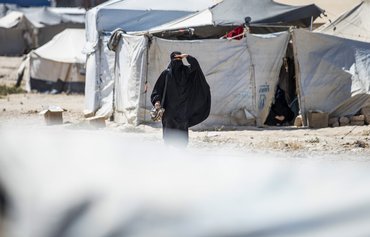Sitting in a wheelchair beside a metal fence in a camp in northern Syria, nine-year-old Ruqaya Mohammad raises a scarf over her face to hide from journalists.
The Egyptian girl lost her left eye, her legs and both her parents during battles against the "Islamic State of Iraq and Syria" (ISIS) in their last Syria redoubt in March.
She now lives in a large tent along with 23 other orphaned children of ISIS foreign fighters in a displacement camp near the town of Ain Issa in the al-Raqa province district of Tal Abyad, under the care of older camp residents.
The children, who range in age from 18 months to 13 years, were born to parents from Russia, Uzbekistan, Indonesia, Tajikistan, Egypt and Iraq.
![A picture taken September 26th, 2019 shows a child among 24 orphans reportedly linked with ISIS foreign fighters who are being cared for by volunteers at a camp in the northern Syrian village of Ain Issa. [Delil Souleiman/AFP]](/cnmi_di/images/2019/10/03/20236-ISIS-orphan-Syria-600_384.jpg)
A picture taken September 26th, 2019 shows a child among 24 orphans reportedly linked with ISIS foreign fighters who are being cared for by volunteers at a camp in the northern Syrian village of Ain Issa. [Delil Souleiman/AFP]
"Among the children, Ruqaya moves me the most," said Sara al-Abdullah, 37, who helps look after the orphans.
"She always looks withdrawn, shy, and sad," said the widowed mother of three, one of nine women residents of the Ain Issa camp paid a small fee to help look after the children.
Children still 'visibly scarred'
The volunteers say some of the children are still visibly scarred after living with their late parents under ISIS.
"They play at shooting each other or planting mines in the earth," al-Abdullah said.
Clutching bits of wood they pretend are guns, she says they throw themselves into imaginary battles, emulating the cries of ISIS fighters.
"All that is ingrained in their heads. There is nothing to help them forget," said al-Abdullah. "They do not study, or go and play with the little ones. It has been taken away from them."
Backed by the international coalition, the Syrian Democratic Forces (SDF) in March expelled ISIS from the last patch of territory it held in the eastern Syrian village of al-Baghouz.
After years of leading the fight against ISIS, Syria's Kurds hold thousands of suspected foreign ISIS members in detention and camps: men and women, but also some 8,000 children -- more than half of whom are under the age of five.
The UN says hundreds of them are unaccompanied.
The 24 orphans in Ain Issa were among the tens of thousands of people to stream out of al-Baghouz in the last weeks of the battle, after months of food shortages and heavy bombardment.
"They were in a pitiful state. They went to hospital and got better," said Ain Issa camp manager Jalal Iyyaf.
But the camp has received no aid for the orphans and is struggling to provide for them, he said.
"We ask for clothes, food, drink as well as help to rehabilitate them, rid them of ISIS ideology," he said.
Need for psychological support
Back in the tent, Suad Mohammed Ameen, 20, said the children she helps need food and clothes -- but also psychological support.
"The toughest part is when they tell me their fathers and mothers were killed in front of them, or how they lost their siblings," she said.
To help ease the pain, she has vowed to tell the children stories, and even teach the girls to crochet.
"I promised them that, after everything they had missed out on, I would help them catch up on reading and writing," she said.
But Iyyaf, the camp manager, said the best solution would be for their home countries to take them back.
Alaa Suleiman al-Saleh, 19, another one of the caregivers, also said she hoped the children would be able to go home.
"The situation in this tent is really difficult," she said. "I hope these children will return to their countries so they can catch up on their education and childhood."

![Orphans reportedly linked with ISIS foreign fighters gather to eat at a camp in the northern Syrian village of Ain Issa, on September 26th, 2019. [Delil Souleiman/AFP]](/cnmi_di/images/2019/10/03/20239-ISIS-orphans-one-600_384.jpg)
![Orphaned children gather around a meal at a camp in Ain Issa, where they are being cared for by volunteers. [Delil Souleiman/AFP]](/cnmi_di/images/2019/10/03/20240-ISIS-orphans-two-600_384.jpg)
![Alaa Suleiman al-Saleh, a volunteer caring for 24 orphaned children reportedly linked with ISIS foreign fighters, knits a garment while children watch at a camp in Ain Issa. [Delil Souleiman/AFP]](/cnmi_di/images/2019/10/03/20241-ISIS-orphans-three-600_384.jpg)
![One of 24 orphaned children reportedly linked with ISIS foreign fighters is silhouetted at a camp in the northern Syrian village of Ain Issa. [Delil Souleiman/AFP]](/cnmi_di/images/2019/10/03/20242-ISIS-orphans-four-600_384.jpg)




